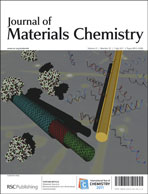In this paper, a kind of core–shell composite microsphere was prepared based on poly(N-isopropylacrylamide-co-methacrylic acid) (P(NIPAM-co-MAA)) coated magnetic mesoporous silica nanoparticles (M-MSN) via precipitation polymerization. The composite microsphere presented a thermo/pH-coupling sensitivity and the volume phase transition could be precisely regulated by the molar ratio of MAA to NIPAM or the concentration of NaCl. At physiological conditions (37 °C, 0.15 M NaCl), the P(NIPAM-co-MAA) shell underwent a distinct transition from a swollen state in pH 7.4 to a collapsed state in pH 5.0, so that the polymer shell was active in moderating the diffusion of embedded drugs in-and-out of the pore channels of MSN. Doxorubicin hydrochloride (DOX) was applied as a model drug and the behaviors of drug storage/release were investigated. The drug loaded behavior was pH-dependent, and the composite microsphere had a drug embed efficiency of about 91.3% under alkaline conditions. The cumulative in vitro release of the DOX-loaded composite microsphere showed a low level of leakage below the volume phase transition temperature (VPTT) and was significantly enhanced above its VPTT, exhibiting an apparent thermo/pH-response controlled drug release. The cytotoxicity assay of a blank carrier to normal cells indicated that the composite microspheres were suitable as drug carriers, while the DOX-loaded composite microspheres had a similar cytotoxicity to HeLa cells compared with free DOX. Therefore, the thermo/pH-sensitive composite microsphere could, in principle, be used for in vivo cancer therapy with a low premature drug release during blood circulation whilst having a rapid release upon reaching tumor tissues.

You have access to this article
 Please wait while we load your content...
Something went wrong. Try again?
Please wait while we load your content...
Something went wrong. Try again?


 Please wait while we load your content...
Please wait while we load your content...